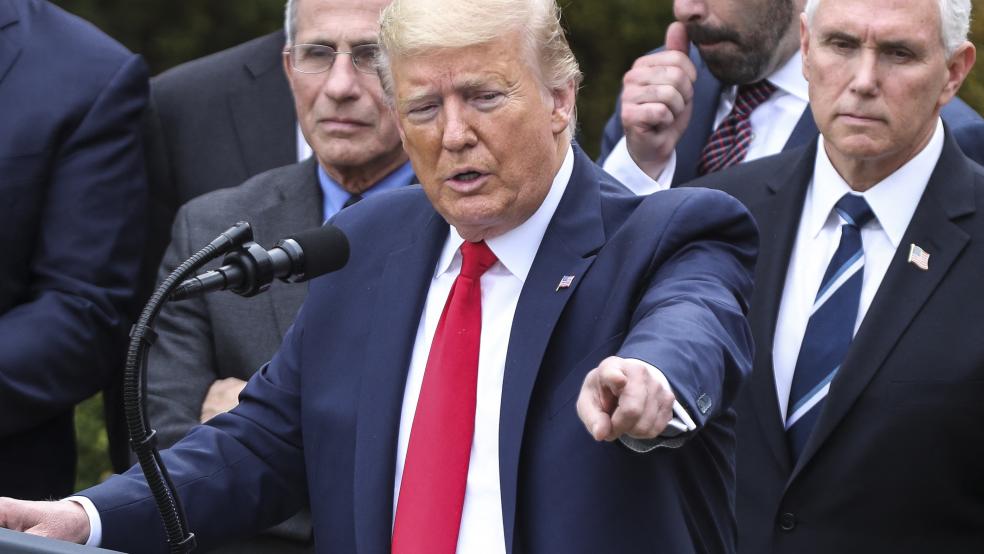President Trump declared the coronavirus a national emergency on Friday and House Speaker Nancy Pelosi announced that, after days of frenzied negotiations, she had reached an agreement with the administration on a large economic relief package meant to help Americans cope with the outbreak.
“We are proud to have reached an agreement with the Administration to resolve outstanding challenges, and now will soon pass the Families First Coronavirus Response Act,” Pelosi said in a statement Friday evening.
Hours earlier, Trump had indicated he did not yet support the deal. “We don’t think the Democrats are giving enough,” he said from the White House Rose Garden. Yet even as he was speaking, Pelosi and Treasury Secretary Steven Mnuchin were holding their 10th and 11th calls of the day.
The negotiated package is focused on providing for free testing for everyone who needs it, including the uninsured, and also includes provisions for paid sick leave, enhanced unemployment insurance, strengthened nutritional security programs like food stamps and increased federal funding for Medicaid, according to Pelosi. “The three most important parts of this bill are testing, testing, testing,” the speaker said Friday.
Democrats had said throughout the day that they would push ahead with a vote on the revised package, with or without support from the administration and House Republicans.
"I know how frustrating the past 48 hours have been. The Speaker has literally been working around the clock to achieve a bipartisan agreement on our further response to the crisis caused by the Coronavirus pandemic," House Majority Leader Steny Hoyer wrote in a letter to colleagues. "If we reach agreement, we'll vote on it. If not, we will vote today on our bill, which incorporates nearly all of what the Administration and Republicans have requested."
What Trump’s emergency declaration means: The president said his emergency declaration would allow for up to $50 billion in aid to flow to state and local governments. It will enable the administration to tap the $42.6 billion in FEMA’s Disaster Relief Fund to help address the damage from the spread of the virus and enables states to request that the federal government cover 75% of emergency expenses, including workers, tests and supplies.
Trump also:
- Discussed a newly announced partnership with the private sector to expand and speed testing for the virus, with widespread drive-through testing and 1.4 million additional tests to be made available next week and 5 million within the next month. The administration had faced heated criticism from lawmakers in both parties about the problems with tests being available.
- Said he was waiving interest on all student loans held by federal agencies.
- Said the government would purchase crude oil to fill the nation’s strategic petroleum reserve.
Trump reportedly had resisted making the national emergency declaration earlier this week, despite pressure from local leaders and congressional Democrats. On Thursday, he told reporters that me may do it “at some point” before adding that the Unites States is “in great shape,” especially compared to other countries.
“Part of Trump’s hesitation to declare a national emergency has seemed to be about saving face,” The Washington Post’s James Hohmann suggested, since the declaration would contradict the president’s previous messages downplaying the threat from the virus, comparing it to the seasonal flu and insisting that his administration had the outbreak under control.
Administration officials had also disagreed whether an emergency declaration was necessary, with some — possibly including Trump himself— reportedly worried that such a move would trigger panic in the financial markets. Instead, major stock indexes surged Friday as Trump made the announcement, ending the day with their biggest one-day gains since October 2008.
What’s next: If the House passes the relief package as expected Friday night, the Senate would take it up next week. But this was just the second in what’s likely to be a series of bills responding to the coronavirus pandemic. “As the Senate works to pass this bill, the House will begin work on a third emergency response package to protect the health, economic security and well-being of the American people,” Pelosi said. This may have been the easy part, too, as consensus on next steps may be even harder to achieve.





